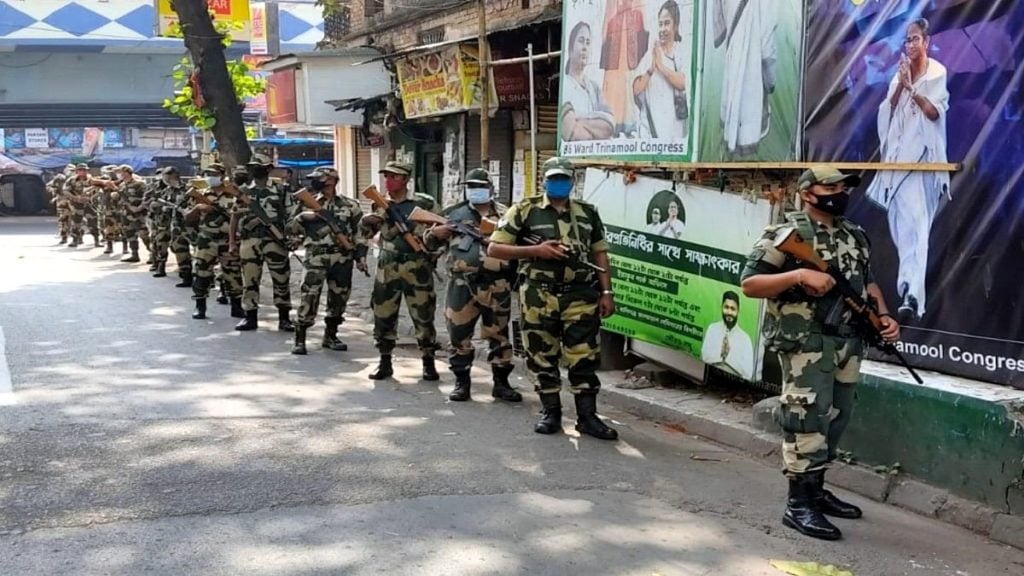The Border Security Force (BSF) has announced a recruitment notification for Assistant Sub Inspector (Stenographer/Combat Stenographer) and Head Constable (Ministerial/Combatant Ministerial) positions within the Central Armed Police Forces (CAPF). Additionally, the recruitment encompasses Warrant Officer (Personal Assistant) and Havildar (Clerk) roles in the Assam Rifles. Interested candidates can apply on the official BSF website from June 9, 2024, to July 8, 2024. This article offers a detailed guide on the syllabus and exam pattern for these positions.
CAPF Recruitment Process Overview
The recruitment process for the Head Constable and ASI CAPF consists of multiple stages, including:
- Computer Based Test (CBT)
- Skill Test
- Physical Standard Test (PST)
- Document Verification (DV)
- Detailed Medical Examination (DME)
All these stages are mandatory and must be cleared by the candidates to secure their positions.
Computer Based Test (CBT)
The CBT is the first stage of the recruitment process. It comprises one paper with 100 objective-type questions, and candidates are given 90 minutes to complete the test.
Exam Pattern of CBT
| Section | Subject | Number of Questions | Total Marks |
|---|---|---|---|
| A | Hindi Language or English Language (optional) | 25 | 25 |
| B | General Aptitude | 25 | 25 |
| C | General Intelligence | 25 | 25 |
| D | Quantitative Aptitude | 25 | 25 |
- Sections B, C, and D will be available in both Hindi and English.
- The questions will be of objective multiple-choice type.
- The test will be set in both Hindi and English languages.
- There is a negative marking of 0.25 marks for each wrong answer.
Syllabus for CBT
Section A: Hindi Language or English Language
- Ability to understand correct English
- Basic comprehension and writing ability
- Error Spotting
- Fill in the blanks
- Vocabulary
- Spellings
- Grammar
- Idioms and Phrases
- Sentence Structure
- Synonyms & Antonyms
- Sentence Completion
- Phrases and Idiomatic use of Words, etc.
Section B: General Aptitude
- Fundamental Arithmetical operations
- Decimals and Fractions and Relationship between Numbers
- Time and Distance
- Discount
- Averages
- Interest
- Mensuration
- Time and Work
- Number Systems
- Profit and Loss
- Use of Tables and Graphs
- Ratio and Time
- Percentages, Ratio & Proportion
- Computation of Whole Numbers
Section C: General Intelligence
- Visual Memory
- Space Orientation
- Social Intelligence
- Discrimination
- Coding & Decoding
- Figural Pattern – Folding & Completion
- Embedded Figures
- Space Visualization
- Problem Solving
- Decision making
- Semantic Series
- Symbolic & Number Analogy
- Venn Diagrams
- Drawing Inferences
- Word Building
- Symbolic Operations
- Spatial Orientation
- Semantic Analogy
- Figural Classification
- Emotional Intelligence
- Observation
- Semantic Classification
- Figural Series
- Analogies
- Word Building
- Figural Analogy
- Symbolic Operations
- Relationship Concepts
- Numerical Operations
- Symbolic & Number Classification
- Number Series
- Critical Thinking
- Arithmetical Reasoning & Figural Classification
- Arithmetic Number Series
- Semantic Classification
Section D: Quantitative Aptitude
- Time & Work
- Speed Time & Distance
- Data Interpretation
- Quadratic Equation
- Pipes & Cistern
- Number Series
- Percentage
- Profit and Loss
- Average
- L.C.M and H.C.F
- Partnership
- Probability
CAPF HC Ministerial Recruitment 2024
Skill Test
After clearing the CBT, candidates move to the Skill Test. The requirements for the Skill Test vary based on the position applied for:
For Assistant Sub Inspector (Steno)
- Candidates are required to take dictation for 10 minutes at a speed of 80 words per minute.
- They then have 50 minutes to transcribe the dictation into English or 65 minutes in Hindi on a computer.
For Head Constable (Ministerial)
- Candidates must demonstrate their typing skills on a computer.
- They can choose between English typing with a minimum speed of 35 words per minute or Hindi typing with a minimum speed of 30 words per minute.
- This corresponds to 10,500 key depressions per hour in English and 9,000 key depressions per hour in Hindi, with an average of 5 key depressions for each word on the computer.
Physical Standard Test (PST)
The PST is conducted to ensure that candidates meet the physical standards required for the role. This includes measurements of height, chest, and weight as per the criteria set by the CAPF.
CAPF Document Verification (DV)
During the DV stage, candidates need to present all their original documents to verify their eligibility, educational qualifications, age, and other criteria.
CAPF Detailed Medical Examination (DME)
The final stage is the DME, where candidates undergo a thorough medical examination to ensure they are medically fit for the duties required in the CAPF.
CAPF Detailed Syllabus 2024
General Intelligence
- Visual Memory: Tests the ability to recall visual information.
- Space Orientation: Assesses the understanding of spatial relationships.
- Social Intelligence: Measures the ability to understand and interact in social settings.
- Discrimination: Evaluates the ability to differentiate between different objects or concepts.
- Coding & Decoding: Involves interpreting codes and patterns.
- Figural Pattern – Folding & Completion: Tests the ability to visualize and manipulate figures.
- Embedded Figures: Identifying figures hidden within other figures.
- Space Visualization: Assessing the ability to visualize spatial arrangements.
- Problem Solving: Tests logical and analytical problem-solving skills.
- Decision Making: Evaluates the ability to make sound decisions.
- Semantic Series: Involves understanding and continuing a series of logical sequences.
- Symbolic & Number Analogy: Tests analogical reasoning skills.
- Venn Diagrams: Understanding and interpreting Venn diagrams.
- Drawing Inferences: Making logical inferences from given information.
- Word Building: Creating words from given letters or patterns.
- Symbolic Operations: Understanding and manipulating symbolic representations.
- Spatial Orientation: Assessing the understanding of spatial relationships.
- Semantic Analogy: Understanding analogies between words and concepts.
- Figural Classification: Classifying figures based on given criteria.
- Emotional Intelligence: Measuring the ability to perceive, use, and manage emotions.
- Observation: Assessing the ability to observe and recall details.
- Semantic Classification: Classifying words and concepts based on meanings.
- Figural Series: Understanding and continuing a series of figures.
- Analogies: Understanding analogical relationships between concepts.
- Word Building: Creating meaningful words from given letters.
- Figural Analogy: Understanding analogies between figures.
- Symbolic Operations: Manipulating symbolic information.
- Relationship Concepts: Understanding relationships between different concepts.
- Numerical Operations: Performing basic numerical operations.
- Symbolic & Number Classification: Classifying symbols and numbers based on given criteria.
- Number Series: Understanding and continuing a series of numbers.
- Critical Thinking: Assessing logical and critical thinking abilities.
- Arithmetical Reasoning & Figural Classification: Combining arithmetic reasoning with figural classification.
- Arithmetic Number Series: Understanding and continuing a series of arithmetic numbers.
- Semantic Classification: Classifying words and concepts based on meanings.
General Aptitude
- Fundamental Arithmetical operations: Basic arithmetic operations including addition, subtraction, multiplication, and division.
- Decimals and Fractions and Relationship between Numbers: Understanding decimals, fractions, and their interrelationships.
- Time and Distance: Solving problems related to time and distance.
- Discount: Calculating discounts on prices.
- Averages: Finding averages of given data sets.
- Interest: Calculating simple and compound interest.
- Mensuration: Understanding the measurement of geometric shapes.
- Time and Work: Solving problems related to time and work.
- Number Systems: Understanding different number systems.
- Profit and Loss: Calculating profit and loss.
- Use of Tables and Graphs: Interpreting and using data from tables and graphs.
- Ratio and Time: Solving problems related to ratio and time.
- Percentages, Ratio & Proportion: Calculating percentages and solving problems related to ratios and proportions.
- Computation of Whole Numbers: Performing computations with whole numbers.
English
- Ability to understand correct English: Understanding the correct usage of the English language.
- Basic comprehension and writing ability: Comprehending and writing English effectively.
- Error Spotting: Identifying and correcting errors in sentences.
- Fill in the blanks: Completing sentences with appropriate words.
- Vocabulary: Understanding and using a wide range of vocabulary.
- Spellings: Correctly spelling words.
- Grammar: Understanding and applying grammar rules.
- Idioms and Phrases: Understanding and using idioms and phrases.
- Sentence Structure: Understanding and constructing sentences correctly.
- Synonyms & Antonyms: Identifying synonyms and antonyms.
- Sentence Completion: Completing sentences logically.
- Phrases and Idiomatic use of Words, etc.: Understanding and using phrases and idiomatic expressions.
Quantitative Aptitude
- Time & Work: Solving problems related to time and work.
- Speed Time & Distance: Solving problems related to speed, time, and distance.
- Data Interpretation: Interpreting data from tables, graphs, and charts.
- Quadratic Equation: Solving quadratic equations.
- Pipes & Cistern: Solving problems related to pipes and cisterns.
- Number Series: Understanding and continuing a series of numbers.
- Percentage: Calculating percentages.
- Profit and Loss: Calculating profit and loss.
- Average: Finding averages of given data sets.
- L.C.M and H.C.F: Calculating the least common multiple and highest common factor.
- Partnership: Solving problems related to partnership.
- Probability: Calculating probabilities of events.
Importance of the Syllabus for Head Constable CAPF Exam
Understanding the syllabus is crucial for candidates preparing for the Head Constable CAPF exam. Here are the key reasons why the syllabus holds paramount importance:
Guidance for Preparation
The syllabus acts as a roadmap, guiding candidates on what topics to cover for the exam. It provides clarity on the subject areas and helps candidates structure their study plan effectively.
Focused Preparation
With a detailed syllabus at hand, candidates can prioritize their preparation based on the weightage of topics. This ensures that they allocate more time and effort to high-scoring areas while covering all the essential topics comprehensively.
Avoidance of Redundant Topics
Understanding the syllabus helps candidates avoid wasting time on irrelevant or redundant topics. They can streamline their preparation by focusing solely on the subjects and concepts specified in the syllabus.
Identifying Strengths and Weaknesses
By aligning their preparation with the syllabus, candidates can assess their strengths and weaknesses in different subject areas. This enables them to strategize better and allocate more time to areas where they need improvement.
Enhanced Confidence
Following the syllabus gives candidates a sense of direction and control over their preparation. This, in turn, boosts their confidence levels as they progress through their study plan, knowing that they are covering all the essential topics required for the exam.
Better Performance in the Exam
Candidates who thoroughly cover the syllabus are better equipped to tackle the exam confidently. They are more likely to answer questions accurately and efficiently, leading to improved performance and higher chances of success.
Conclusion
The CAPF HC Ministerial Syllabus and exam pattern are integral to the preparation for candidates aspiring to join the CAPF. By understanding and adhering to the detailed syllabus, candidates can optimize their study efforts and enhance their chances of success. The comprehensive breakdown of each section, along with the importance of focusing on the syllabus, underscores the need for a structured and strategic approach to exam preparation. As candidates embark on this journey, they must utilize the syllabus as their guiding tool, ensuring they cover all essential topics and are well-prepared to excel in the examination.
FAQs
1. What is the Skill Test for Assistant Sub Inspector (Steno)?
Candidates are required to take dictation for 10 minutes at a speed of 80 words per minute. They then have 50 minutes to transcribe the dictation into English or 65 minutes in Hindi on a computer.
2. What is the Skill Test for Head Constable (Ministerial)?
Candidates must demonstrate their typing skills on a computer. They can choose between English typing with a minimum speed of 35 words per minute or Hindi typing with a minimum speed of 30 words per minute. This corresponds to 10,500 key depressions per hour in English and 9,000 key depressions per hour in Hindi.
3. What is assessed in the Physical Standard Test (PST)?
The PST assesses candidates’ physical standards, including measurements of height, chest, and weight as per the criteria set by the CAPF.
4. What documents are required for Document Verification (DV)?
During the DV stage, candidates need to present all their original documents to verify their eligibility, educational qualifications, age, and other criteria.
5. What is the Detailed Medical Examination (DME)?
The DME involves a thorough medical examination to ensure that candidates are medically fit for the duties required in the CAPF.










